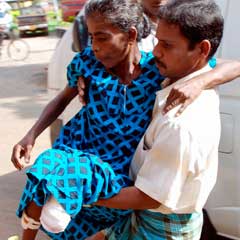Up to 35,000 Tamil Civilian Casualties, Says Catholic Aid Worker
by Michael Swan, The Catholic Register, Canada, May 27, 2009
|
Joe bases his casualty estimate on reports that there were 330,000 civilians in the district of Vanni in March. At the time Sri Lanka's military dismissed that number, saying there were no more than 70,000 civilians in Vanni.
"But now 290,000 people have just come out of Vanni, not the internment camps. If you make a little bit of mathematics, you know at least 30-to-40,000 people are still there, unaccounted for," he said.
|
 |
| An injured Tamil woman who lost her leg is carried into the main hospital in the town of Vavuniya in northern Sri Lanka May 6. (CNS photo/Reuters) |
A Catholic aid worker who left Sri Lanka days before the end of his country's 26-year civil war has told The Catholic Register that between 25,000 and 35,000 Tamil civilians were killed or injured in the final days of the war.
The aid worker said Sri Lanka's military used multi-barreled rocket launchers, cluster bombs and chemical weapons in heavily populated areas held by the Liberation Tigers of Tamil Eelam, the rebel army that once held sway in most of Sri Lanka's north and east.
"The government was ruthless," said the aid worker, who asked to be identified simply as Joe. Joe has worked in the government-run refugee camps, but said he would not be able to return to Sri Lanka if he is identified.
"The situation in the country is not so conducive to the revelation of my identity," said the Tamil Catholic. "I am not unnecessarily worried about my life, but it has to go for a worthy cause."
Journalists, doctors and aid workers have disappeared after publicly questioning government policy or casting doubts on the government's version of events in the war zone, Joe said.
The 25,000 to 35,000 Joe claims were killed or injured in the last days of the war are in addition to the 6,500 killed and 13,000 injured in the first three months of 2009, according to United Nations estimates.
"Those who were killed and wounded were definitely more than 40,000," he said.
Joe bases his casualty estimate on reports that there were 330,000 civilians in the district of Vanni in March. At the time Sri Lanka's military dismissed that number, saying there were no more than 70,000 civilians in Vanni.
"But now 290,000 people have just come out of Vanni, not the internment camps. If you make a little bit of mathematics, you know at least 30-to-40,000 people are still there, unaccounted for," he said.
War crimes were committed on both sides of the conflict, Joe said. Families who resisted Tamil Tiger demands for able-bodied fighters faced dire consequences, said Joe.
"They have been beaten by the militants and at times killed," he said.
Tamil Tiger demands for ever greater sacrifices led to Tamil-on-Tamil conflicts as the Tigers made their last stand.
"There was a lot of opposition from the people and there were clashes between the people and the militants. And there were sometimes injuries, and deaths also — relatively few, but it happened."
Joe hopes the end of the war will mean a new political culture in both the Tamil and Sinhalese communities.
"If you introduce a new way of thinking, a new way of living, new way of discussing things there is a lot of hope, but it all depends on how much the present political regime will pave the way for such developments," he said.
He also believes the Catholic community could play a role in healing the divisions of the last 26 years.
"The Catholic Church and the Christian community are the only ones to embrace both the communities — the Tamil-speaking and the Sinhalese," said Joe. "We are in a privileged position to influence the culture, to be a counterculture to the prevailing culture in the country."
Christians make up about 20 per cent of Sri Lanka's Tamil-speaking majority and about five per cent of Sri Lanka's population as a whole.
The Catholic witness for peace will be compromised unless the church can overcome its own divisions, he said.
"The church itself is split along the lines of ethnicity. I don't think anyone can deny that."
Diaspora Tamils protesting on the streets of Toronto, London and other cities with large Tamil communities have a role to play in urging international powers to put pressure on the Sinhalese-dominated government in Colombo, he said.
"They have every right to demand justice from the international community and I think they should continue with that," said Joe.
The first sign of a new spirit from Sri Lanka's military and its government would be to speed up resettlement of nearly 300,000 people currently in refugee camps.
 "Keeping them in detention centres is against international humanitarian laws," he said. "At least now they have to be treated with humanity and with love and compassion, and put them back on their feet." "Keeping them in detention centres is against international humanitarian laws," he said. "At least now they have to be treated with humanity and with love and compassion, and put them back on their feet."
Michael Swan is Associate Editor of The Catholic Register. He is an award-winning writer and photographer and holds a Master of Arts degree from New York University.
|
 Home
Home Archive by Date
Archive by Date Archive by Category
Archive by Category About the Sangam
About the Sangam Engage Congress
Engage Congress Multimedia
Multimedia White Papers
White Papers Links
Links Search This Site
Search This Site
